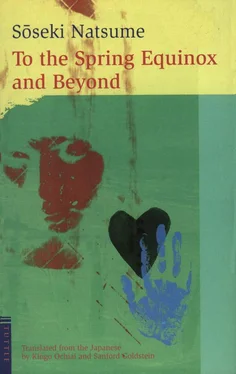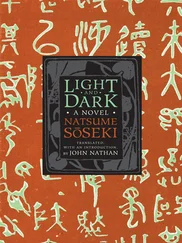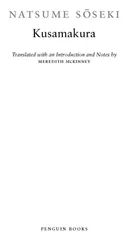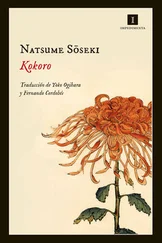Natsume Soseki - To the Spring Equinox and Beyond
Здесь есть возможность читать онлайн «Natsume Soseki - To the Spring Equinox and Beyond» весь текст электронной книги совершенно бесплатно (целиком полную версию без сокращений). В некоторых случаях можно слушать аудио, скачать через торрент в формате fb2 и присутствует краткое содержание. Год выпуска: 2006, Издательство: Tuttle Publishing, Жанр: Классическая проза, на английском языке. Описание произведения, (предисловие) а так же отзывы посетителей доступны на портале библиотеки ЛибКат.
- Название:To the Spring Equinox and Beyond
- Автор:
- Издательство:Tuttle Publishing
- Жанр:
- Год:2006
- ISBN:нет данных
- Рейтинг книги:5 / 5. Голосов: 1
-
Избранное:Добавить в избранное
- Отзывы:
-
Ваша оценка:
- 100
- 1
- 2
- 3
- 4
- 5
To the Spring Equinox and Beyond: краткое содержание, описание и аннотация
Предлагаем к чтению аннотацию, описание, краткое содержание или предисловие (зависит от того, что написал сам автор книги «To the Spring Equinox and Beyond»). Если вы не нашли необходимую информацию о книге — напишите в комментариях, мы постараемся отыскать её.
To the Spring Equinox and Beyond — читать онлайн бесплатно полную книгу (весь текст) целиком
Ниже представлен текст книги, разбитый по страницам. Система сохранения места последней прочитанной страницы, позволяет с удобством читать онлайн бесплатно книгу «To the Spring Equinox and Beyond», без необходимости каждый раз заново искать на чём Вы остановились. Поставьте закладку, и сможете в любой момент перейти на страницу, на которой закончили чтение.
Интервал:
Закладка:
The following Sunday favored all office workers with fine weather, so Keitaro called on Sunaga early in the morning to invite him for a walk in the suburbs. Sunaga came out to the entrance, but being indolent and self-willed, he did not readily acquiesce. However, he was at last compelled to slip on his shoes after some strong urging from his mother. Once someone got Sunaga to put his shoes on, he would easily move in any direction Keitaro wanted, silently accepting his friend's lead and not, when consulted about where to go, insisting on any particular direction himself. When he and his Yarai uncle, Matsumoto, went out together, they would both walk on without considering where they were headed, so that they often ended up at a place least expected by either. Keitaro had heard about such instances from Sunaga's mother.
That day they went by train from Ryogoku as far as a station at the foot of Konodai Plateau. They strolled leisurely along the bank of the beautiful wide river there. In a lighthearted mood that he had not felt for some time, Keitaro looked out over the water, the sailboats, and the hills. Sunaga praised the view too, but complained about the cold, blaming Keitaro by saying it was not yet the season for walking along such a bleak embankment. Telling Sunaga that if he'd walk faster, he'd warm up, Keitaro began to quicken his pace. Sunaga followed with somewhat of a bewildered look on his face. They reached a spot near Taishakuten Temple at Shibamata and stopped at a restaurant called the Kawajin. Sunaga was again compelled to frown, this time claiming that the broiled eel they had ordered had been sweetened too much.
Keitaro, distressed that because their mood was not ripe for it he could find no opportunity to enter into any kind of confidential talk, took the occasion to remark, "You Edoites are quite fastidious, aren't you? Are you even so hard to please about finding wives?"
"Any man would be if he were allowed a voice in the matter. It's not limited to Edoites. Even a country bumpkin like you would be," Sunaga replied with perfect nonchalance.
"You Edoites are also rather blunt, aren't you?" Keitaro couldn't help saying and burst into a laugh. Sunaga seemed equally amused and laughed aloud.
After that their conversation progressed as harmoniously as their mood. Sunaga commented that lately Keitaro seemed to have settled down quite a bit, which Keitaro accepted quietly.
"You mean I've gotten a little more serious? But you're tending to become more and more obstinate," Keitaro bantered.
Sunaga, with good grace, admitted his weakness. "Sometimes I hate myself for being like that."
They were now in a congenial mood in which they could look directly into one another's eyes without feeling any restraints. It was fortunate for Keitaro that the problem of Chiyoko was brought up during such a time, since he had been wanting to hear what the actual story was. He directly assailed Sunaga with the rumor he had heard the previous week that she was shortly to be married. Sunaga didn't show the least sign of agitation, but in more somber tones than usual replied, "Apparently another offer's about to be made. I hope it's settled this time." He then added with a sudden change in tone that seemed to indicate he had grown weary of the subject, "Unknown to you of course, there have been many such discussions."
"You don't feel at all like marrying her yourself?"
"Does it look that way?"
And so their talk proceeded, each trying to drag the topic on until it was driven either to the point where something critical had to be confessed or the subject had to be dropped. Finally, with a wry smile Sunaga said, "You've brought your cane with you again, haven't you?"
Keitaro, smiling too, went out to the restaurant's open corridor and returned with the inevitable cane. "Uh-huh," he said and showed Sunaga the snakehead.

Sunaga's story was much longer than Keitaro had expected.
My father died years ago. He died suddenly when I was very young, when I had no real understanding of the affection that exists between a parent and child. Since I have no children, my affection toward those of my own flesh and blood may still be comparatively weak, but the feeling of endearment I have toward the parents who brought me into the world has developed considerably since that time. I often wish that in those days I had had the love for them I now have. I was, in short, quite cold toward my father, although he himself never indulged me either. The portrait I have of him in my mind is merely that of a stern face, one with high cheekbones and a sallow complexion, a face that could scarcely endear itself to a child. Each time I look in the mirror, I'm reminded of the remarkable resemblance between my own face and the face of my father that I've stored in my mind, and this displeases me. I feel ashamed not only because I have to worry about giving others as unpleasant an impression of myself as my father gave of himself, but also because of the miserable feeling of a son remembering only the unfavorable surface of his father as the sole memento of that father. Judging from myself as I am now — I do have a warmer affection flowing in me than my own gloomy eyebrows and forehead suggest — I suspect my father to have had at the bottom of his heart tears much warmer than my own despite the callousness of his outward appearance.
A few days before my father died, he called me to his bedside. "Ichizo," he said, "when I die, you'll have to be looked after by your mother. You realize that, don't you?" Since it was my mother who had taken care of me from the day I was born, it struck me as odd to be warned anew in this way by my father at the last moment. I merely sat there silently, having nothing to say. My father — it seemed like he had to forcibly move the lines on his face, which was all skin and bone — spoke again. "If you continue to be as mischievous as you are now, your mother won't be here to watch over you either. So behave yourself." I knew quite well that my mother had taken care of me until that time, so I didn't feel like I had to change the way I'd been. Thinking that his rebuke was totally unnecessary, I left the sickroom.
When my father died, my mother cried a great deal. Just before the coffin was to be taken from the house, I was alone in the open hallway. I had changed into my funeral attire and, since I didn't have anything else to do, was looking up at the blue sky when my mother, dressed in the white silk kimono bereaved wives wear, suddenly came over to me. Taguchi and Matsumoto and the others who were to go with the coffin were all busily occupied in another part of the house, so no one was there except my mother and me. All at once she put her hand on my close-cropped hair and fixed on me her eyes, which were swollen from crying. Then in an undertone she said, "Even though your father has just died, don't worry. I'll look after you just as I always have." I didn't say anything. Nor did I cry. It was an incident that was over and done with in a moment, but I've since come to feel keenly that it was those remarks of my parents that have cast a shadow over the memory I have of the two of them.
Whenever I asked myself why I had harbored such doubts about those words, words that didn't need to have any particular significance attached to them, I found myself unable to explain the reason. At times I had half a mind to question my mother directly about them, but whenever I looked at her face, my resolve failed. And somewhere in my mind something cropped up and whispered to me that once I confided my secret thoughts to her, the close relationship of mother and son would be so damaged that we would never be given the chance to recover the harmony we were enjoying. If it didn't come to that, it was likely that my mother would gaze at my overly serious face and laugh everything away by saying, "Was there ever actually such a thing?" When I thought about the cruel effect that such an evasion would have on our relationship, I resolved to keep quiet at any cost about my secret doubt.
Читать дальшеИнтервал:
Закладка:
Похожие книги на «To the Spring Equinox and Beyond»
Представляем Вашему вниманию похожие книги на «To the Spring Equinox and Beyond» списком для выбора. Мы отобрали схожую по названию и смыслу литературу в надежде предоставить читателям больше вариантов отыскать новые, интересные, ещё непрочитанные произведения.
Обсуждение, отзывы о книге «To the Spring Equinox and Beyond» и просто собственные мнения читателей. Оставьте ваши комментарии, напишите, что Вы думаете о произведении, его смысле или главных героях. Укажите что конкретно понравилось, а что нет, и почему Вы так считаете.












